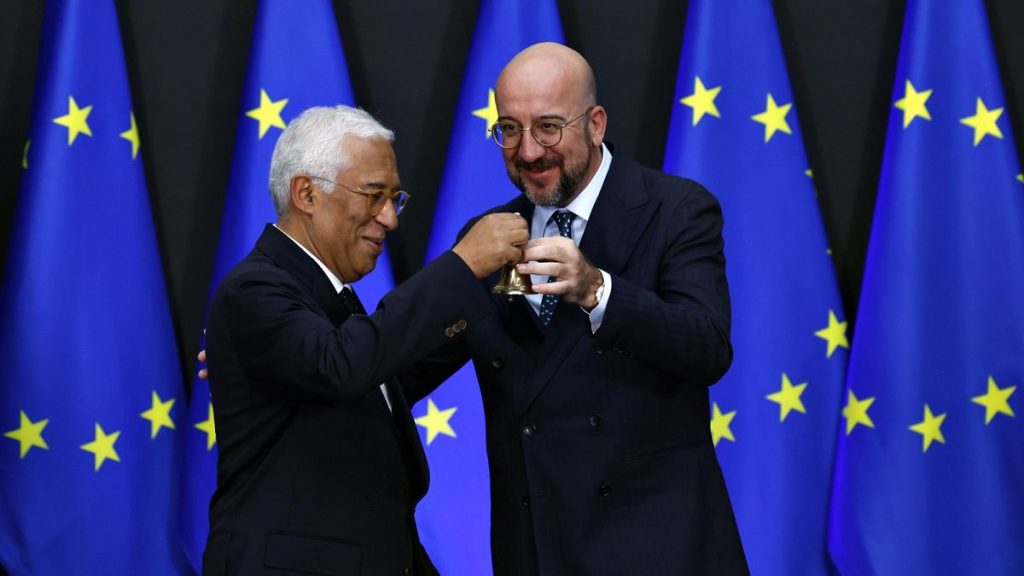Summarize this content to 2000 words in 6 paragraphs
António Costa will take office as president of the European Council on 1 December as part of the EU’s new institutional cycle.
A changing of the guard has taken place in Brussels. Charles Michel, the outgoing president of the European Council, has handed the baton (or in this case, the bell) to his successor António Costa. The brief ceremony on Friday was marked by calls for political unity in the face of adversity.”The only way to be truly patriotic is to ensure sovereignty, to build a common Europe. Because only together can we stand up for security, stability and peace in our continent. Only together can we achieve shared prosperity, economic growth and the climate transition,” Costa said before a crowd of officials and diplomats.”Unity is the lifeblood of the European Union.”Costa, the former prime minister of Portugal, will take office on 1 December, coinciding with the start of Ursula von der Leyen’s incoming European Commission leadership. His tenure will last two-and-a-half years with the possibility of a one-time extension.Von der Leyen and Michel had a notoriously frosty relationship, dating back to the Sofagate episode in Turkey. Costa intends to close this chapter and “work closely” with von der Leyen to “reinforce each other’s action,” said a senior EU official.As president of the European Council, he will prepare and moderate EU summits, where leaders set the political agenda of the bloc’s future. The position lacks executive powers and is largely aimed at representation and coordination.In his speech, the incoming president portrayed himself as a bridge-builder and argued that “differences of opinion” between member states, which are frequent and numerous, should be respected instead of treated as a “problem”.”We have 27 different histories and cultures, and we look at the world from different geographic locations. That diversity is perfectly natural. It enriches us and we can, in fact, harness it. It is Europe’s strength,” the 63-year-old said.Janis A. Emmanouilidis, deputy chief executive of the European Policy Center (EPC), thinks Costa will be vocal about his views while keeping all leaders on the same page.Costa “will try to strike compromises, find consensus – hopefully, compromises – not at the lowest common denominator, because this is not what Europe needs at this present point in time,” Emmanouilidis told Euronews.Once in office, Costa will become the most prominent figure of the socialist family in Brussels, together with Teresa Ribera, the Commission’s first executive vice president. For the socialists, these two appointments are vital to maintaining a certain degree of influence as the bloc continues its right-wing shift.António Costa’s agendaAmong Costa’s top priorities will be support for Ukraine, defence policy, competitiveness, migration management and the reform of the EU budget, topics that von der Leyen has also highlighted for her second presidency.”Peace cannot mean the peace of a graveyard. Peace cannot mean capitulation. Peace must not reward aggression. Peace in Ukraine must be just. It must be lasting. It must be based on international law,” he said on Friday. “This war is on European soil but at stake are the universal principles enshrined in the United Nations Charter.”Another focus of special attention will be enlargement, a sensitive area where unanimity between leaders is essential to moving forward. Albania, Bosnia and Herzegovina, Georgia, Moldova, Montenegro, North Macedonia, Serbia, Turkey and Ukraine are currently candidates to join the bloc (Turkey’s bid has long been frozen, while Georgia’s has been put on hold).Costa believes accession negotiations should advance without “artificial timelines but also without undue obstacles.” This marks a departure from Charles Michel’s approach, who famously set a 2030 deadline for enlargement that the Commission, which evaluates the progress made by each applicant, refused to endorse.”Enlargement to the Western Balkans and our Eastern neighbors is a powerful tool for peace, security and prosperity and a geopolitical imperative,” he said.In another break from Michel, Costa wants to make sure EU summits last just one day rather than two, and the drafting of conclusions is done by the time leaders sit at the table, even if this could prove impossible for pivotal discussions like the budget.The incoming president also wants to host “informal retreats” outside the grey institutional sphere of Brussels to let leaders address the most crucial topics on the agenda “without the pressure of taking a decision,” said the senior official quoted above. The first one is expected to take place on 3 February and will be dedicated to defence, with NATO Secretary General Mark Rutte also attending.”These retreats will allow ideas to converge into a certain direction,” the official explained.Costa, whose father was half French-Mozambican and half Indian, is the first person of colour to occupy a top job in the bloc’s history.
Keep Reading
Subscribe to Updates
Get the latest creative news from FooBar about art, design and business.
© 2026 Globe Timeline. All Rights Reserved.













